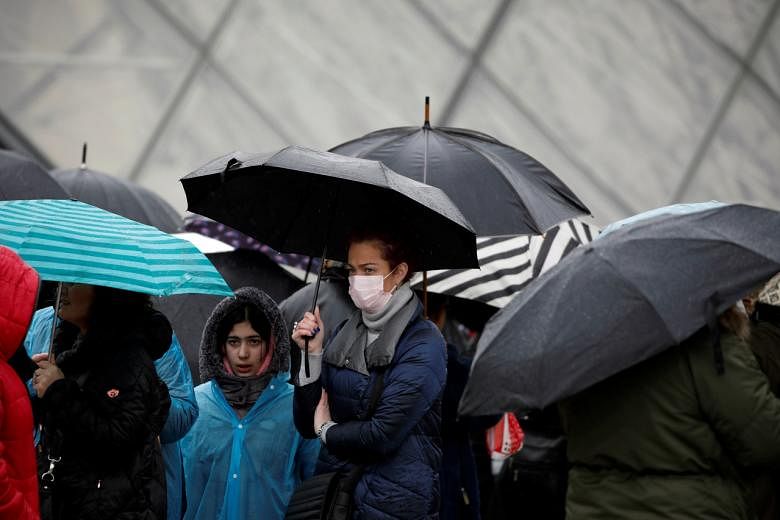WASHINGTON (REUTERS, AFP) - Group of Seven nations are drafting a statement outlining a plan to soften the economic hit of the coronavirus but which so far excludes direct calls for new government spending or coordinated central bank rate cuts, a G-7 official said on Tuesday (March 3).
In the statement, expected on Tuesday or Wednesday, G-7 countries will pledge to work together to mitigate the damage to their economies from the fast-spreading epidemic, the official told Reuters on condition of anonymity due to the sensitivity of the matter.
The news disappointed financial markets, which are hoping for more explicit measures of support by the seven major industrial powers. US stock futures slipped into negative territory and the US dollar gave up earlier gains against the safe-haven Japanese yen.
Stocks had rallied sharply on Monday as central banks from Japan, Britain and France followed the lead of the US Federal Reserve in saying they stood ready to support the global economy.
The language of the statement could change as it is still under discussion, the source said.
Stephen Innes, chief market strategist at AxiCorp, said such a message from the G-7 was not what markets had been hoping for.
"At this stage, I don't think the G-7 are willing to show their stimulus hand and are holding back the fiscal cannons for a later date once they can better quantify the supply-side shock from Covid19," Innes said in a note, referring to the disease caused by the virus.
The United States - this year's G-7 chair - said the group's finance ministers and central bank governors will hold a conference call on Tuesday morning to discuss measures to deal with the epidemic and its economic impact.
The virus, which has spread to 60 countries, has killed more than 3,000 people and upended global supply chains.
On Tuesday, Australia's central bank cut interest rates to record lows in what is expected to be the first in a spate of policy stimulus around the world to fight the economic fallout from the coronavirus.
LIMITS OF POLICY
Analysts, however, have doubts about how effective rate cuts might be.
While central bank and fiscal policy can boost demand by lowering the cost of borrowing and putting money in people's wallets, they cannot repair disrupted global supply chains or convince people to fly if local governments or companies bar such activities.
With rates in Japan and Europe already in negative territory, those doubts are even more amplified, suggesting the Bank of Japan and the European Central Bank could seek alternatives to simply cutting rates.
"A lower price of money does not fix the fear that people have of catching the virus," said Joe Capurso, foreign exchange analyst at Commonwealth Bank of Australia in Sydney.
THE NECESSARY SUPPORT
US economists also doubt whether an interest rate cut by the Federal Reserve would be effective against the economic disruption caused by the epidemic.
Powell on Friday issued a statement pledging the Fed would "use our tools and act as appropriate to support the economy."
The Bank of England, for its part, said it was monitoring the situation and working closely with domestic "as well as our international partners to ensure all necessary steps are taken to protect financial and monetary stability."
France's Finance Minister Bruno Le Maire pledged on Monday the French government would provide the necessary support for domestic companies.
"We will demonstrate total solidarity towards entrepreneurs who are on the front line," he said, noting that the government already had decided to let suppliers out of their contracts due to the coronavirus.
While the outbreak has yet to shutter or slow many factories outside of China, it has already hit the transportation and tourism sectors and seen companies scale back travel and cancel conventions.
France's famed Louvre museum, a key attraction in one of the world's top tourism destinations, closed Sunday and the US called off the ASEAN leaders summit set for April.
The International Monetary Fund and World Bank issued a joint statement Monday pledging to help countries deal with the fallout from the epidemic.
"We will use our available instruments to the fullest extent possible, including emergency financing, policy advice, and technical assistance," the lending institutions said.
GROWTH SLASHED
Powell in his statement on Friday acknowledged the epidemic poses a risk to growth, and a closely-watched US industry survey Monday showed the manufacturing sector slowed sharply in February due to the virus, having only just shown signs of recovery from the impact of the US trade war with China.
The IMF has warned the already-fragile global economy will see slower growth as a result of the virus.
Le Maire said that the economic impact of the coronavirus on France's economy will be greater than previous estimates.
"Now that the epidemic has hit many more countries, in particular France, the impact of the coronavirus on French growth will be much more significant" than if it had been contained to France, he said.
Until now, the French government has forecast 1.3 percent growth for this year, and two weeks ago Le Maire said he expected the coronavirus to shave 0.1 percentage points off that.
Meanwhile, the EU's Internal Market Commissioner, Thierry Breton, said the coronavirus could tip Germany and Italy into recession, though it is too early to tell.











